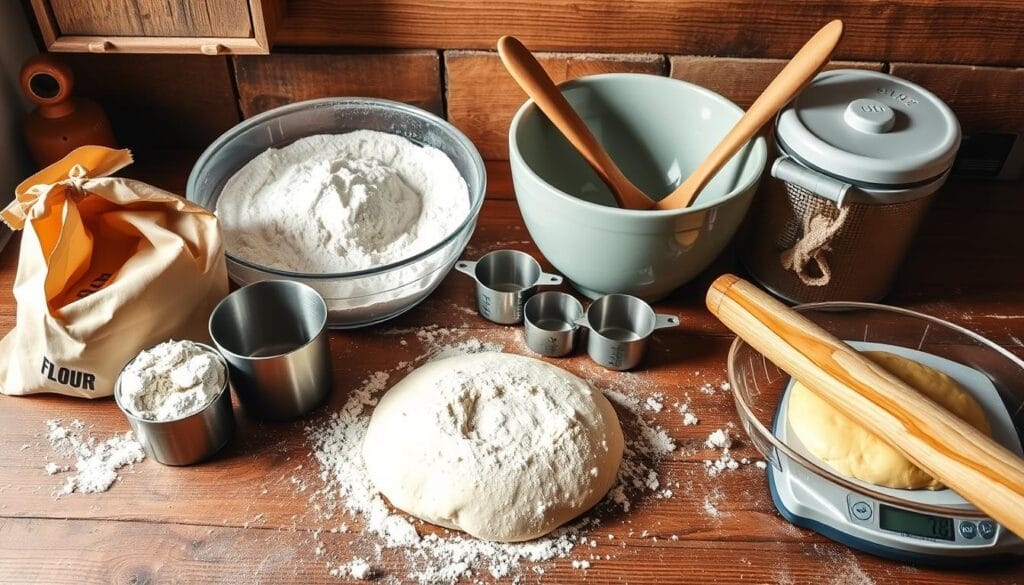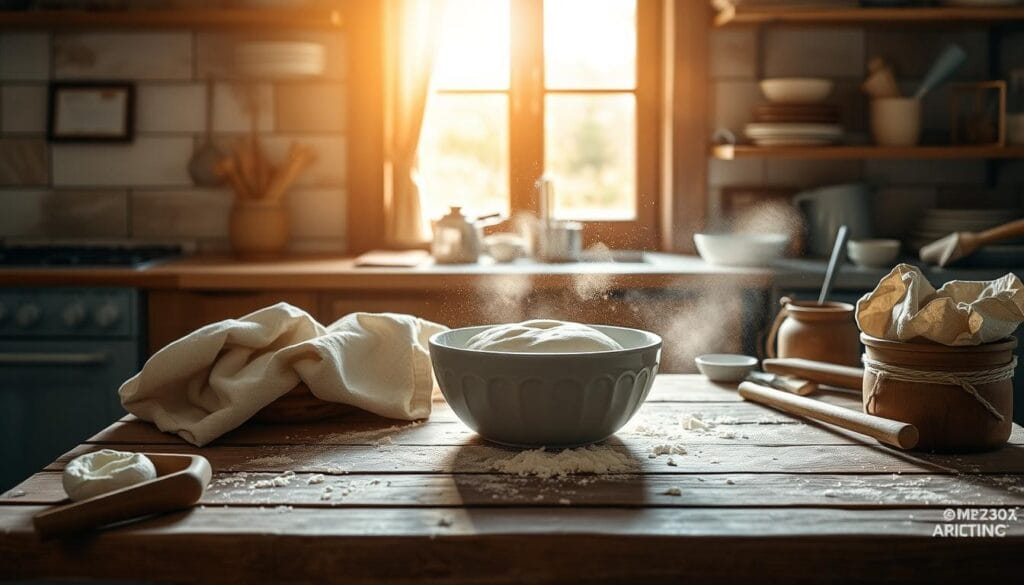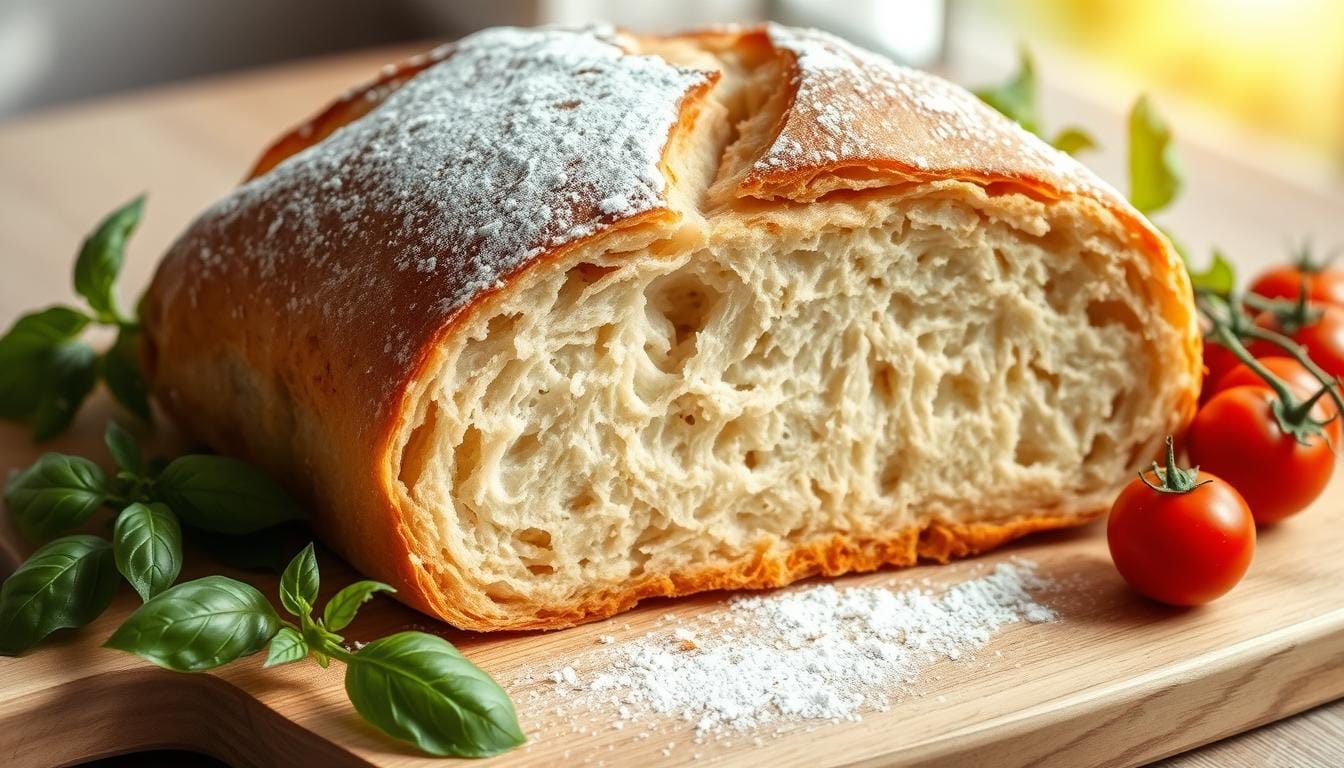The Best Italian Bread Loaf Recipe for Beginners
The smell of fresh bread, the crunch of a golden crust, and the soft chew inside are what make Italian bread special. As a home cook, I’ve worked hard to get this right. Today, I’m excited to share a classic Italian bread loaf recipe that will impress everyone.
Table of Contents
Understanding Traditional Italian Bread Making
Making authentic Italian bread is simple yet traditional. Breads like ciabatta, focaccia, and panini use just a few ingredients. They are baked in a hot oven, often on a flat stone.
This method creates a bread with a crispy crust and soft inside. It’s perfect for soaking up sauces and oils.
Origins and Authenticity
Italian bread-making has been perfected over centuries. It’s passed down through generations. Yeast, natural fermentation, and quality ingredients like sourdough bread make these loaves special.
Key Characteristics of Italian Bread
Italian bread is known for its moist, thick crumb. It can soak up the flavors of soups, sauces, and oils. The loaves are often oval-shaped and have a savory taste.
The dough is wetter because of the liquid and fat used. This makes the bread unique.
Why Make Bread at Home
Baking ciabatta, focaccia, and other Italian breads at home has many benefits. You can control the ingredients and baking process. This way, you get fresher, tastier bread with better texture.
Plus, you can experiment with flavors and techniques. This lets you find your perfect loaf.
Essential Ingredients for Italian Bread Loaf
Making the perfect Italian bread loaf begins with the right ingredients. At its core, a few key elements come together. They create the bread’s signature texture and flavor.
The dough’s base is all-purpose flour, needing about 8 cups. Some add bread flour for extra chewiness. The leavening power comes from active dry yeast, 2 ¼ teaspoons or 1 packet.
| Ingredient | Amount |
|---|---|
| All-purpose flour | 8 cups |
| Active dry yeast | 2 ¼ teaspoons or 1 packet |
| Warm water | 3 ½ cups |
| Shortening | 1 tablespoon |
| Salt | 3 teaspoons |
| Sugar | 1 teaspoon |
Adding a bit of olive oil or butter can make the bread even better. With these ingredients, you’re ready to make a delicious Italian bread loaf at home.
“The secret to truly authentic Italian bread lies in the quality and balance of its core ingredients.”
Required Tools and Equipment
Making the perfect Italian bread loaf needs a few key tools in your kitchen. You’ll need basic utensils and specialized baking gear. The right tools can greatly improve your homemade bread.
Basic Kitchen Tools
- Large mixing bowl
- Electric mixer or stand mixer
- Measuring cups and spoons
- Wooden spoon or spatula
- Kitchen scale
- Serrated knife
Special Baking Equipment
To get that Italian bread texture and crust, you’ll need special equipment:
- Pizza stone or inverted baking sheet for a crispy crust
- Broiler pan for steam during baking
- Dough scraper for shaping and dividing the dough
- Proofing basket or bowl for risen dough
Optional but Helpful Items
Some extra tools can make breadmaking easier:
| Item | Benefit |
|---|---|
| Dutch oven | Creates a steamy environment for baking crusty loaves |
| Dough hook attachment for stand mixer | Efficiently kneads the dough |
| Parchment paper | Prevents sticking and eases dough transfer |
| Bread lame or sharp knife | Scores the dough for an artisanal look |
“Having the right tools is essential for achieving the perfect Italian bread loaf at home.”
Preparing Your Kitchen for Bread Making
Before starting your Italian bread-making, make sure your kitchen is ready. The right baking preparation and kitchen setup are key to a successful homemade loaf.
Start by cleaning your workspace and removing any clutter. This gives you enough room to knead, proof, and shape your dough. Heat your oven to 450°F (232°C) with a pizza stone or baking sheet inside to get that perfect crust.
To create steam during baking, put a broiler pan on the oven’s lower rack. This helps make your bread’s crust just right. Keep your kitchen around 75°F (24°C) or a bit warmer for the dough to rise well. If it’s cooler, use the oven’s lowest setting to help the dough rise.
- Clean and clear your workspace for ample room to work
- Preheat oven to 450°F (232°C) with a pizza stone or baking sheet inside
- Place a broiler pan on the lower rack for steam creation during baking
- Maintain a room temperature around 75°F (24°C) or slightly warmer for proofing
- Use the oven’s lowest temperature setting if the kitchen is cool
With your kitchen set up for baking preparation and kitchen setup, you’re ready to make a delicious Italian bread loaf at home.

| Ingredient | Amount |
|---|---|
| All-purpose flour | 5 1/2 cups (660g) |
| Warm water | 2 cups (480ml) |
| Rise time | 1 hour 30 minutes |
| Oven temperature | 375°F |
| Baking time | 30-35 minutes |
| Yield | 2 loaves, 24 servings |
Step-by-Step Mixing and Kneading Process
Making the perfect Italian bread starts with mixing and kneading the dough. This step is key to getting a light, airy, and tasty loaf. Let’s look at the important techniques for making great bread dough.
Initial Mixing Technique
First, proof the yeast. Mix lukewarm water and active-dry yeast in a big bowl. Wait 5-10 minutes for the yeast to get frothy and active. Then, add flour, salt, and olive oil to the yeast mixture.
Use a wooden spoon or a stand mixer with a dough hook to mix. Keep mixing until you get a shaggy dough.
Proper Kneading Methods
- If kneading by hand, put the dough on a floured surface. Knead for 7-8 minutes until it’s smooth and elastic.
- For a stand mixer, knead for 3-4 minutes on medium speed. The dough should be smooth and elastic.
- For no-knead recipes, use the stretch and fold method. Stretch and fold the dough 4 times, rotating the bowl 90 degrees each time. Do this after a 30-60 minute rest.
Visual Cues for Perfect Dough
The perfect dough is slightly sticky and forms a ball. It should pass the “window pane” test. This means you can stretch a small piece thin enough to see light through without it tearing.
“Kneading the bread dough is a meditative process. It lets you feel the dough change from a shaggy mass to a smooth, elastic ball. Enjoy the process and let your hands guide you to the perfect texture.”
Mastering the initial mixing and kneading is key to perfect Italian bread dough. With practice and attention to visual cues, you’ll bake a delicious homemade Italian bread.
The Art of Dough Proofing
Italian bread making relies on bread proofing and dough rising. This step lets yeast ferment, gluten develop, and dough expand. It makes the bread light, airy, and full of flavor. Getting good at dough proofing is key for the perfect Italian bread texture and crumb.
The first rise takes at least 2 hours at room temperature. Or, it can last 18-72 hours in the fridge overnight. This slow process enhances the bread’s taste. After shaping, the second rise should be about 40 minutes. This lets the loaf double in size and spring back when pressed.
For overnight proofing, the dough becomes loose and bubbly. This means it’s time to bake. Refrigerated proofing also boosts the bread’s flavor. Checking if the dough springs back quickly is a good way to know it’s ready.
| Proofing Temperature | Proofing Duration |
|---|---|
| Warm (80°F/26°C) | 1-2 hours |
| Cold (39°F/4°C) | 10-16 hours |
Keeping the right proofing conditions is vital for perfect Italian bread. By mastering bread proofing, you can bake delicious Italian loaves at home.

Shaping Your Italian Bread Loaf
Making the perfect Italian bread loaf is more than just mixing ingredients. The shaping step is key. It turns the dough into a beautiful and sturdy loaf. Let’s dive into the art of bread shaping and dough scoring to make your homemade Italian bread a masterpiece.
Creating the Perfect Form
First, move the dough to a floured surface. Use your hands to stretch and shape it into a rectangle. Fold the top third down and the bottom third up, like a letter.
Then, roll the dough up from the short end. Seal the layers as you roll. Place it, seam-side down, in a bowl with parchment paper. Let it proof one last time before baking.
Scoring Techniques
- Use a sharp knife or lame to score the dough with an “X” pattern before baking.
- This scoring lets the bread expand and get a beautiful crust design.
- Try different patterns like parallel lines or diamonds to find your favorite.
Getting good at bread shaping and dough scoring takes time. But the results are worth it. With patience and detail, you can make stunning Italian bread loaves that wow everyone.
Mastering the Baking Process
The final step in making your authentic Italian bread loaf is mastering the baking process. This is where the dough turns into a golden-brown, crusty masterpiece. The key to perfect bread baking is to watch the oven temperature, timing, and techniques closely.
Start by heating your oven to a very hot 450°F (232°C). This high heat is key for the oven spring. It makes the bread rise and gives it an airy texture. If you have a baking stone or steel, preheat it too. It helps make the crust perfectly crisp.
When your oven is ready, carefully put the shaped dough on the preheated surface. For an extra-crusty crust, add a cup of hot water to a broiler pan on the bottom rack. The steam will make the bread’s exterior crunchy. Bake the bread for 24 to 28 minutes, until it’s golden brown. If using a Dutch oven, bake covered for 15 minutes, then remove the lid and bake for another 20 minutes.
FAQ
What are the key ingredients for making an authentic Italian bread loaf?
What tools and equipment are needed to make homemade Italian bread?
How do I prepare my kitchen for bread making?
What are the key steps in mixing and kneading the dough?
How do I properly proof the dough?
How do I shape the Italian bread loaf?
What is the proper baking process for an Italian bread loaf?
Source Links
- Grandma’s Italian Bread – https://www.365daysofbakingandmore.com/grandmas-italian-bread/
- Giada’s Classic Italian Bread – https://giadzy.com/blogs/recipes/giada-s-classic-italian-bread?srsltid=AfmBOooWg3o7ZuxCSqoGNunCCjGBHvbYNWjb-EI3FjVFx1nD4MInPLEO
- Italian Bread – https://preppykitchen.com/italian-bread/
- Italian Bread – https://baranbakery.com/italian-bread/
- Easy Italian Bread You’ll Want To Make Again And Again – https://www.thespruceeats.com/italian-bread-428161
- What Is The Difference Between Italian Bread And Sicilian Bread? – https://medium.com/@lynn_26947/what-is-the-difference-between-italian-bread-and-sicilian-bread-c01f5c990fcf
- Giada’s Classic Italian Bread – https://giadzy.com/blogs/recipes/giada-s-classic-italian-bread?srsltid=AfmBOoroifgiVHQ1SXyMGcAVDXQbipRfegyeqv2FQndGJKKSpJ0vkI6g
- Breadmaking Tools I Love • baste cut fold – https://bastecutfold.com/breadmaking-tools-i-love/
- My Highly Curated Baking Tools | The Perfect Loaf – https://www.theperfectloaf.com/my-baking-tools/
- Ciabatta Bread Recipe – https://www.browneyedbaker.com/ciabatta-bread/
- Easy Italian Bread – https://feelingfoodish.com/italian-bread/
- Stand Mixer Italian Bread – https://thecreeksidecook.com/stand-mixer-italian-bread/
- No-Fuss Italian Bread – https://thesaltedpepper.com/homemade-italian-bread/
- Easy Italian Bread Recipe: Bake a Big, Soft Loaf in Your Own Kitchen – https://heartscontentfarmhouse.com/big-soft-italian-loaf-bread/
- Semolina Bread – https://vintagekitchennotes.com/semolina-bread/
- The Ultimate Guide to Proofing Bread Dough | The Perfect Loaf – https://www.theperfectloaf.com/guides/proofing-bread-dough/
- Is Your Bread Dough Kneaded Enough? Here’s How to Tell. – https://www.tasteofhome.com/article/how-to-tell-if-youre-kneading-dough-the-right-way/?srsltid=AfmBOoqYe8NZsYa6QS-_zYTg6CZaFUBVi5WHWAvKSBdnT_A2W_4PoVsx
- What happens if you use too much yeast in bread? – https://medium.com/@lynn_26947/what-happens-if-you-use-too-much-yeast-in-bread-af424a12d660
- The Ultimate Guide to Shaping Bread Dough | The Perfect Loaf – https://www.theperfectloaf.com/guides/shaping-bread-dough/
- Discover the Delight of Italian Bread, Ciabatta Rolls, and English Muffin Bread – https://justmillit.com/whisked-italian-bread-ciabatta-rolls-and-english-muffin-loaf/
- Soft and Chewy Crusty Italian Bread: A Must-Try Recipe – https://justmillit.com/crusty-italian-bread-fresh-milled/
- Breaking Bread: The Significance of Freshly Baked Loaves in Italian Dining – Trattoria Toscana – https://ttitalian.com/italian-cuisine/breaking-bread-the-significance-of-freshly-baked-loaves-in-italian-dining/
- Easy Italian Bread Recipe: Classic Homemade Loaf – https://www.funsweetrecipes.com/italian-bread-recipe/

